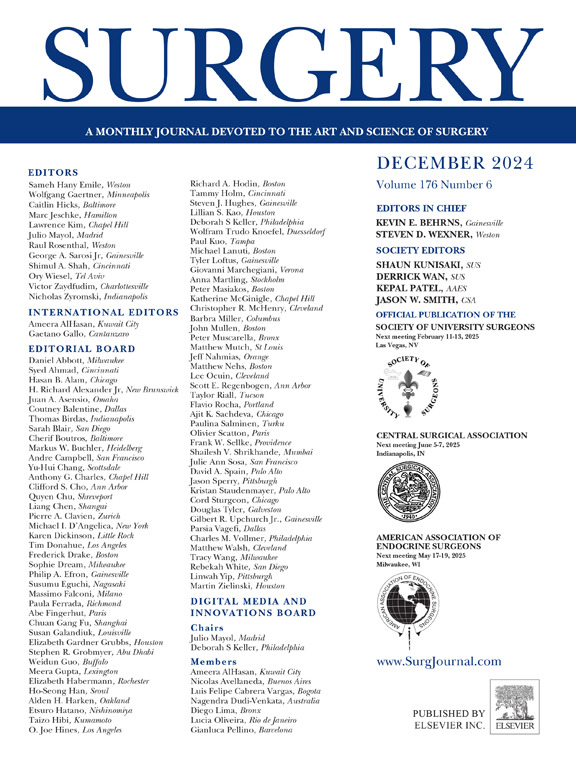术前禁食与肺误吸无关联:一项系统回顾和荟萃分析
IF 2.7
2区 医学
Q1 SURGERY
引用次数: 0
摘要
自1946年以来,术前禁食一直是术前护理的标准组成部分,当时胃容量和误吸之间存在关联。大量文献研究了各种禁食方案对代孕结局的影响,但很少有研究将吸入本身作为主要结局。方法回顾2016年1月1日至2023年12月1日期间发表的比较术前禁食方案和观察性研究结果的随机临床试验。主要的主要结局是临床吸痰。次要结局包括胃容量和ph。对结局数据进行随机效应荟萃分析。进行了试验顺序分析,以确定进一步研究禁食对误吸事件的影响是否会改变当前分析得出的结论。结果在最初检索到的3580篇文献中,有17篇被纳入分析。其中9例报告了误吸事件的结局。临床吸痰不受各种术前禁食方案的影响。误吸事件的优势比= 1.17(95%可信区间:0.32-4.23,P = 0.81, I2 = 0%, n = 8项研究,实验组801例,对照组990例)。实验组801例患者中有4例(0.50%)发生误吸,对照组990例患者中有7例(0.71%)发生误吸。吸入研究的试验顺序分析显示,发现新的禁食方案对吸入的显著影响的可能性很小。大多数研究报告胃容量和/或pH值作为误吸的替代结果。替代结果胃容量和pH从未被证明与人类麻醉相关的误吸相关。结论自由禁食政策与目击误吸无相关性。对更自由的禁食政策的进一步研究不太可能发现两者之间的联系。大多数先前的禁食-吸痰-禁食文献依赖于从未被证明与临床吸痰相关的替代结果。缺乏证据证明禁食和渴望之间的关系,这表明禁食政策可能会自由化。手术前禁食可以用床边胃超声检查胃容量来代替。本文章由计算机程序翻译,如有差异,请以英文原文为准。

No association between preprocedural fasting and witnessed pulmonary aspiration: A systematic review and meta-analysis
Background
Preprocedural fasting has been a standard component of preoperative care since 1946 when an association between gastric volume and aspiration was made. A large body of literature exists examining various fasting regimen effects on surrogate outcomes, but few studies have investigated aspiration itself as the primary outcome.
Methods
Randomized clinical trials comparing outcomes from preprocedural fasting regimens and observational studies of witnessed aspiration events published between January 1, 2016, and December 1, 2023, were reviewed. The main primary outcome was clinical aspiration. Secondary outcomes included gastric volume and pH. Random effects meta-analysis was performed on the outcomes data. Trial sequential analysis was performed to determine the likelihood that further studies of fasting effects on aspiration events will change conclusions drawn from the current analysis.
Results
Of the 3,580 initial references found in the initial search, 17 were included in the analysis. Of these, 9 reported outcomes for aspiration events. Clinical aspiration was not affected by the various preprocedural fasting regimens. Odds ratio for aspiration events = 1.17 (95% confidence interval: 0.32–4.23, P = .81, I2 = 0%, n = 8 studies, 801 patients in experimental groups, and 990 patients in control groups). Aspiration was rare, occurring in 4 of 801 patients (incidence of 0.50%) in experimental groups and 7 of 990 patients (0.71%) in control groups. Trial sequential analysis of aspiration studies showed little likelihood of finding a significant effect of new fasting regimens on aspiration. Most studies reported gastric volume and/or pH as a surrogate outcome for aspiration. The surrogate outcomes gastric volume and pH have never been shown to correlate with human anesthesia-related aspiration.
Conclusion
There was no association between liberal fasting policies and witnessed aspiration. Further study of more liberal fasting policies is unlikely to find an association. Most of the prior fasting-aspiration-fasting literature relied on surrogate outcomes that have never been shown to correlate with clinical aspiration. The lack of evidence demonstrating a relationship between fasting and aspiration suggests that fasting policies might be liberalized. Preprocedural fasting might be replaced by bedside gastric ultrasound examination of gastric volume.
求助全文
通过发布文献求助,成功后即可免费获取论文全文。
去求助
来源期刊

Surgery
医学-外科
CiteScore
5.40
自引率
5.30%
发文量
687
审稿时长
64 days
期刊介绍:
For 66 years, Surgery has published practical, authoritative information about procedures, clinical advances, and major trends shaping general surgery. Each issue features original scientific contributions and clinical reports. Peer-reviewed articles cover topics in oncology, trauma, gastrointestinal, vascular, and transplantation surgery. The journal also publishes papers from the meetings of its sponsoring societies, the Society of University Surgeons, the Central Surgical Association, and the American Association of Endocrine Surgeons.
 求助内容:
求助内容: 应助结果提醒方式:
应助结果提醒方式:


